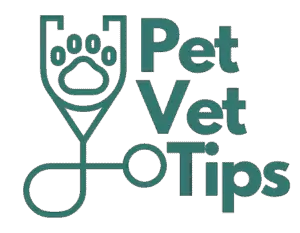This article contains affiliate links, and we may earn a commission at no cost to you if you choose to purchase through these links. I never recommend products that I do not trust or will not advise my veterinary clients and patients to use.
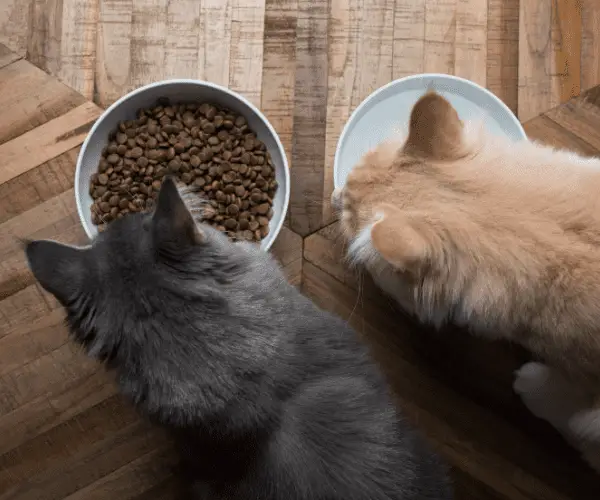
Munchkin cats owe their adorable short legs to a genetic condition called chondrodystrophy, which may predispose the iconic ‘sausage cat’ to certain diseases. Consequently, nutrition is paramount in maintaining the health of this unique breed.
The two most important factors to consider when formulating the ideal diet for Munchkin cats are body weight control and joint support. A calorie-controlled diet high in Omega 3, glucosamine, and chondroitin should be the basis of Munchkin cat nutrition. Due to their short limbs relative to their long torsos, Munchkin cats are prone to arthritic conditions and weight gain.
Food is medicine, and the research on feline health and nutrition is evolving rapidly. In this article, we will take a deep dive into how you can use nutrition to help your Munchkin live a long, happy, and healthy life.
Health Conditions Munchkin Cats Are Prone To And How Nutrition Can Help
Many of these diseases may be directly linked to the genetic make-up of these cats and, as a result, are not curable (or even preventable) in certain instances. Although nutrition may not be able to reverse many of these conditions, it may help to drastically reduce their progression and help to provide the correct quantity and quality of nutrients that will make the life of the munchkin cat more comfortable.
Obesity
Munchkin cats are often less active because they are not as capable of jumping, climbing, and running compared to cats with normal-length limbs, causing them to expend fewer calories daily.
Munchkin cats are the ideal cat breed for small apartments, and in fact, it is highly recommended that this breed be kept indoors only (there are 8 reasons why Munchkins should be kept indoors– read our article on this if you would like to learn more). This consequently also means that Munchkins will be less active compared to indoor-outdoor cats that may wander around the neighborhood daily.
In addition, Munchkin cats have lower body weight to muscle mass ratio compared to longer-limbed cats. A lower muscle mass to body weight ratio directly translates to a lower basal metabolic rate compared to a cat of the same weight but with longer limbs.
Carrying around excess body weight can contribute to degenerative joint and spinal conditions, which can be especially detrimental to a Munchkin. Maintaining a healthy, lean body condition should therefore be considered the most crucial factor when selecting the correct diet for your Munchkin.
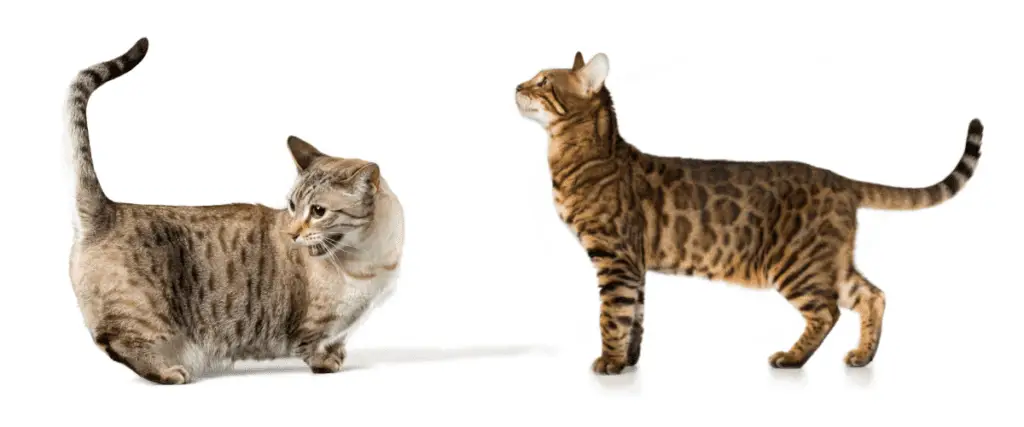
Pet Vet Tip: Have you ever wondered how high a Munchkin Cat can jump? Or whether Munchkin cats land on their feet when falling, as other cats do? Click on the links to find out!
Osteoarthritis
Osteoarthritis is a degenerative disease that causes a breakdown of bone and cartilage in the cat’s joints. Munchkins are prone to osteoarthritis due to their chondrodystrophic conformation.
The first and most important dietary consideration to protect your cat against osteoarthritis is to maintain a healthy body weight with good muscle tone.
Secondly, ingredients and supplements containing high-quality omega 3, glucosamine, chondroitin, and MSM can help slow the progression of degenerative joint changes with age. This will be discussed in more detail later in this article.
Munchkin cats are genetically susceptible to other musculoskeletal conditions such as lordosis and pectus excavatum. Munchkins suffering from these conditions have a higher risk of developing osteoarthritis at an early age.
Lordosis causes a convex curvature of the spine in the lower back due to the spinal muscles being too short. Pectus excavatum is caused by an abnormal cartilage growth connecting the sternum and ribs. Pectus excavatum can be surgically corrected if diagnosed early but can contribute to early onset arthritis in aging Munchkins.
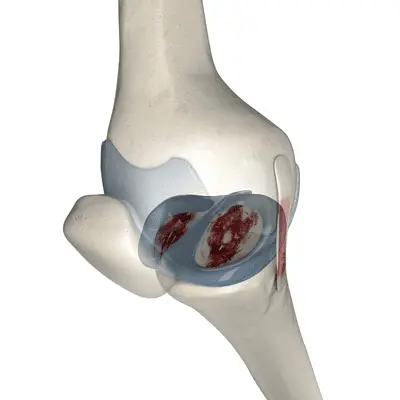
Feline Lower Urinary Tract Disease
Feline Lower Urinary Tract Disease encompasses many different conditions that affect the bladder and urethra of cats. The most common cause of FLUTD is stress, for example, the presence of a new roaming cat in the environment or a sudden change in a Munchkin’s environment or routine.
FLUTD has a plethora of evidence showing that dietary intervention can help treat and prevent this condition. In fact, FLUTD is the feline disease that has by far the most evidence supporting the importance of dietary intervention as a cornerstone of treatment.
A diet that lowers the urinary pH and reduces the solutes in the urine is paramount in preventing recurring FLUTD. These are things that most supermarket cat food fails to achieve by a long shot and should be enough reason alone to steer clear of the cat food aisle in your local supermarket.
Nine out of ten cats I see suffering from FLUTD are on a low-quality budget cat food. Budget cat food will often add plant-based sources of protein to their food to be able to market a higher protein percentage on the packaging at a lower price.
As obligate carnivores, cats should have a low or acidic urine pH. Plant-based diets directly cause a higher urine pH, creating the ideal environment for forming certain types of urinary crystals or stones. Crystals or stones in the urine not only cause the bladder wall to become thickened and inflamed but may also lead to urinary obstruction, which is a life-threatening emergency.
You will be able to buy a year’s worth, if not two years’ worth, of high-quality cat food for the price of treatment for obstructed FLUTD. So please, if there is one favor you can do for your wallet and your Munchkin, it is this: get them on a good quality veterinary cat food!
Pancreatitis
The pancreas is an often understated organ. It produces insulin and glucagon- the two most important hormones responsible for blood sugar control and also stores and secretes digestive enzymes.
Pancreatitis is an inflammatory condition that, if severe, can cause the pancreas to release digestive enzymes in the abdominal cavity causing severe and life-threatening inflammation and infection in the abdomen. Following pancreatitis, the pancreas may have a reduced capacity to produce insulin, leading to a pre-diabetic or diabetic state.
Munchkin cats are genetically prone to developing pancreatitis. Currently, it is known that a high-fat diet, or a sudden increase in the fat content of the diet, can result in the onset of pancreatitis. Consequently, Munchkin cats should ideally be fed a lower fat, lower calorie diet.
Chronic Kidney Disease
Chronic kidney disease is the most common health condition of senior felines. The kidneys play an essential part in filtering the blood and excreting harmful waste products. The kidneys are also responsible for fluid balance, blood pressure, and blood pH.
If kidney function declines, your cat’s body will no longer be able to excrete metabolic waste products from the blood as effectively as it should and may not be able to maintain normal hydration and blood pressure, leading to slow onset symptoms such as excessive drinking, urinating, reduced appetite, nausea, and lethargy.
Unfortunately, the kidneys can not heal as skin or bone can, and as soon as kidney damage becomes chronic, it is irreversible. The other downside of chronic kidney disease is that we will often only pick up on declining kidney function when more than 40% of total kidney capacity has been lost.
The aim of dietary intervention in cats suffering from chronic kidney disease is to reduce the load of the kidney by reducing potential metabolic waste products that need to be excreted by the kidneys and encouraging appetite since cats suffering from kidney disease often have a poor appetite.
When it comes to the question of preventing chronic kidney disease, the best you can do is to ensure that your cat eats a high-quality diet and has access to ample clean water. There is no real benefit to feeding kidney-specific diets before chronic kidney disease is diagnosed; however, it will not be harmful to feed a kidney care diet to a cat that is not suffering from declining kidney function.
The only thing I would caution against is the fact that diets formulated for cats suffering from kidney disease are often calorie dense and highly palatable, leading to unwanted weight gain, which will have other downsides such as aggravating arthritic pain in Munchkin cats.
As a rule of thumb, healthy Munchkin cats younger than seven years of age do not need to be fed a kidney-specific diet unless your vet diagnoses a kidney condition.
The Basics Of Nutrition
The world of nutrition is an exciting, albeit scary, place for many pet owners. Being constantly bombarded with fancy jargon and a multitude of different products may be very confusing and even overwhelming, thereby making it difficult to decide what diet is best for your pet.
Diets are ultimately all broken down into ingredients that provide the basic nutrients that all animals need to survive. The ratios of these nutrients may be altered to best suit the individual needs of the cats according to their breed, current life stage (kittens under one year old, adult cats between one and seven years old, or geriatric cats older than seven years) sensitivities or diseases that they may be suffering from.
The reason why nutrition is so important and the reason why so much emphasis should be placed on it is simply that it is critical for optimal health, development, and longevity.
This table serves to provide a very basic summary of the different nutrients that are included in both prescription and commercial diets. Nutrients all work together to provide key benefits, and they each have many different roles to play in the body.
The five most important nutrients are carbohydrates, proteins, fats, minerals, and vitamins. Water is also an essential substance that some may consider to be the sixth essential nutrient.
It is important to note that cats are considered to be obligate carnivores. This means that protein and fat from animal sources should be the main ingredients in cat diets.
| Role of Nutrients | Nutrients |
| Providing energy | – Fats: the most important energy source for cats – Carbohydrates: less important energy source. Cats can happily tolerate dietary carbohydrates up to 30% – Protein: cats can effectively utilize dietary protein as an energy source |
| Physical development and maintenance | Fatty acids Amino acids (there are 11 essential amino acids for cats, with taurine being the most important one that all cats need from their diet) Minerals Vitamins |
| Targeted support for common concerns like the effects of aging, skin conditions, gut problems, joint aches, and pains | Essential fatty acids (omega-3 and -6) Fiber Prebiotics and probiotics Antioxidants |
Although good quality nutrients are the cornerstone of any good pet food, it is also important to remember that the texture, taste, and variety of the ingredients also play a role in the acceptance of the diet by your cat. After all, it is all good and well to feed them a great diet; however, it will be completely useless if your cat does not want to eat it.
Munchkin Cats’ Dietary Requirements
Due to a munchkin cat’s short stature and predisposition to health conditions such as obesity, osteoarthritis, and potentially kidney disease, it is essential to feed them the proper diet to help mitigate any of these issues. Excesses, as well as deficiencies, can be detrimental to their health and so you should ensure that they receive a balanced diet that has the correct ratio of nutrients that is both easily digestible and palatable.
It is valuable to speak to your veterinarian or pet care professionals when selecting a diet for your Munchkin cat. They will be able to guide you in making the right decision by conducting a physical examination and collecting information that will aid in determining the best nutritional profile for your cat. They can then advise you on what would be best to feed them.
The following table is a guide to the most common veterinary prescription, and commercial diets that are available and their respective indicated uses as they apply to common conditions affecting munchkin cats.
These are not the only diets that are available on the market but are diets that are commonly recommended by veterinarians for the prevention or support of health-related issues that may affect Munchkin cats.
| Brand | Image of Food | Indication for Use |
| Hill’s Science Diet Perfect Weight | – Weight loss and weight management. – Supports fat loss and maintenance of lean muscle. -Contains no chicken by-products. | |
| Hill’s Prescription Diet Metabolic | – Very high success rate of weight loss in obese cats – Improved satiety – Supports fat loss and maintenance of lean muscle – Formulated to promote a urinary environment that reduces the risk of developing FLUTD. | |
| Hill’s Prescription Diet Multi-benefit w/d | – Supports fat metabolism and maintenance of lean muscle mass – Helps manage blood sugar – Promotes urinary tract health – Promotes healthy digestion and formed stool | |
| Hill’s Prescription Diet c/d Multicare Stress Urinary Care | 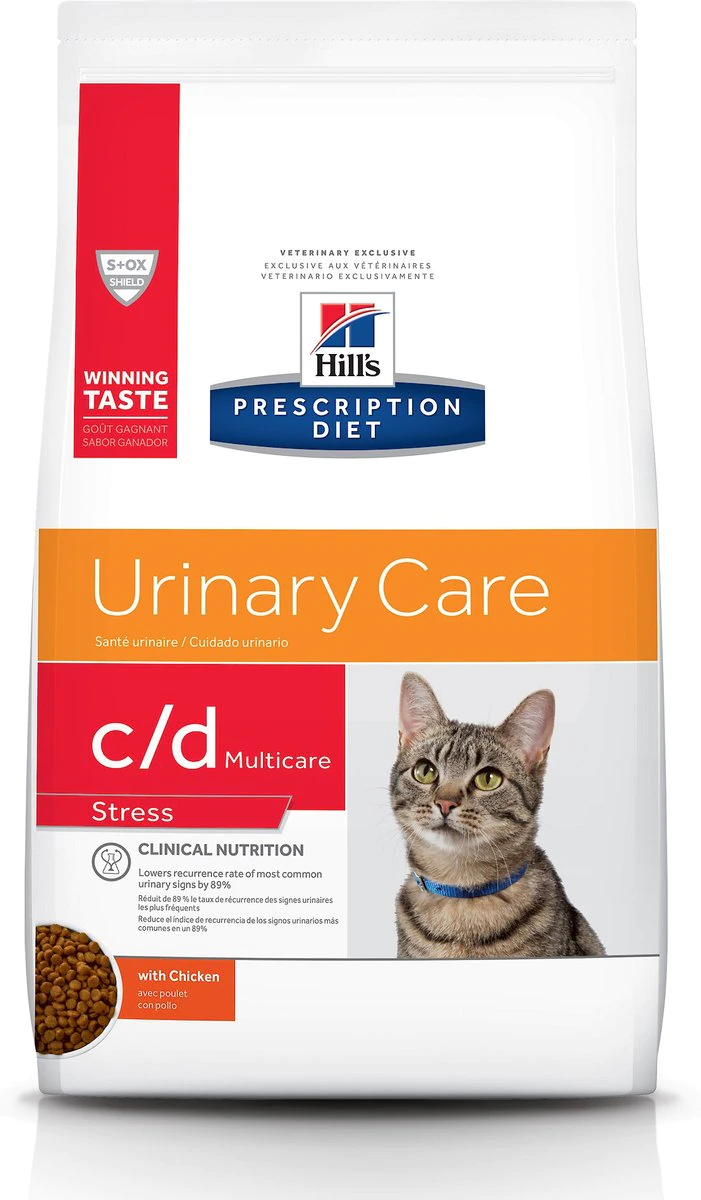 | – Promotes a healthy urinary environment that reduces the risk of the developing FLUTD – L-tryptophan and milk protein hydrolysate help control stress, one of the leading causes of FLUTD |
| Royal Canin Satiety Support | – High Fiber diet helps support satiety – especially important for those cats that just seem to be hungry all the time. – Lower in fat and therefore lowers the risk for pancreatitis. | |
| Royal Canin Renal | – Formulated to support kidney function – Available in early consult (early kidney disease or suspected kidney disease), F (Flavorful), S (Savory), and A (Aromatic) variants. The F, S, and A variants are higher in calories to help maintain the weight of cats that have been diagnosed with chronic kidney disease. | |
| Hill’s Prescription Diet Kidney + Mobility k/d j/d | – Supports kidney function – Supports joint health – Formulated for aging cats that may have a reduced appetite: enhances appetite and supports vitality and alertness | |
| Hill’s Prescription Diet Thyroid Care y/d | – Formulated for cats diagnosed with hyperthyroidism – Helps to decrease thyroid hormone production – Support kidney, heart and urinary health – Helps maintain lean muscle mass |
To Supplement or Not to Supplement
There are many supplements on the market which are gaining popularity as an alternative to prescription pain medication or as an additional homeopathic remedy for both cats and dogs.
Not all supplements, however, are created equally, and administering them to your pet may not be necessary, especially if they are on a good quality diet that is already tailored to their specific needs.
Common Feline Supplements Include:
- Hairball supplements
- Elm bark
- Psyllium seed
- Marshmallow root
- Joint supplements
- Glucosamine hydrochloride
- Chondroitin
- Omega-3 fatty acids from fish oils
- Hyaluronic acid
- MSM
- Weight control supplements
- L-carnitine (positive metabolic effect)
- L-lysine (reduces lean muscle mass loss)
- Conjugated linoleic acid (CLA)
- Hydroxycitric acid
Supplements may be beneficial in preventing things like obesity, anxiety, hairballs, and joint problems; however, some supplements have only been tested and proven for human use, with that information being extrapolated to pets. This means that there may not be any information that was directly obtained from animal studies, and so, giving supplements may result in side effects in your munchkin cat.
Although supplements play an important role in the nutritional well-being of your pet, they should be used with caution.
As a general rule, we recommend feeding a high-quality, veterinary formulated diet to your Munchkin cat rather than spending large amounts of money on a bunch of supplements. Most high-quality health-condition-specific formulated diets already contain beneficial supplemental ingredients such as added Omega 3 and antioxidants.
Obesity and Treats for Munchkins
Obesity is a major problem in many pets, including Munchkin cats. It is commonly from overfeeding and indulging them with too many of their favorite foods. An animal is classified as obese when it is 15% or more above its ideal body weight. Treating your cat can be a great way to show your cat care and love but remember, sometimes too much of this kind of love can be a bad thing.
Excess fat severely affects your Munchkin’s health and longevity. Often obesity is an overlooked condition or one that is simply not recognized by pet owners. Obesity is a chronic, low-level inflammatory condition that greatly increases the risk of osteoarthritis, heart disease, high blood pressure, cancer, and diabetes mellitus. In general, it can significantly reduce the life span of your cat and promote the progression of underlying diseases that they may already have.
A good way to prevent overfeeding your cat and still give them the treats they enjoy is to include the treats in their daily energy allowance. As a rule of thumb, treats should not exceed 10% of your Munchkin’s total daily intake. Total daily intake is determined in a multitude of ways, and often, all you need to do is follow the manufacturer’s directions on the back of the feed bag to ensure that your cat is fed the right amount of food. Another way to calculate their total daily intake is by using the following equation:
- Body weight (Kg) x 30 + 70 = total daily intake (Kcal)
- 10% of this value can be allocated to treats, and the remaining 90% can be allocated through their normal diet, which subsequently means that you could give treats every day if you wanted to (you also don’t have to give treats at all)
There are many different treats available and which one you give depends on your personal preferences. There are many recipes available for homemade treats too that can easily be found on the internet. The following are homemade treat recipes as per the Hill’s Pet Nutrition website that can be made using the Hills’ cat tin food:
Conclusion
Munchkin cats are great cats to have as pets, especially for people who have limited space, as they can happily be kept indoors. In fact, we strongly suggest that you keep your Munchkin indoors! However, they are prone to certain diseases, which makes good quality nutrition a vital part of their husbandry. Limiting overfeeding is key to preventing obesity and ensuring that your Munchkin can live a happy and healthy life.
References
- Yu, S., Paetau-Robinson, I. Dietary Supplements of Vitamins E and C and β-Carotene Reduce Oxidative Stress in Cats with Renal Insufficiency. Vet Res Commun 30, 403–413 (2006).
- Freeman, L., Abood, S. and Fascetti, A., 2022. Disease prevalence among dogs and cats in the United States and Australia and proportions of dogs and cats that receive therapeutic diets or dietary supplements. [online] American Veterinary Medical Association.
- Jezyk, P., 1985. Constitutional Disorders of the Skeleton in Dogs and Cats. In: C. Newton and M. Nunamaker, ed., Textbook of Small Animal Orthopaedics, 1st ed. [online] New York: International Veterinary Information Service.
- Sellers, S., Gandolfi, B., Gustafson, N., Coates, J., Fox, D., Britt, L., Kuroki, K. and Lyons, L., 2022. The Munchkin Cat Phenotypic and Genotypic Characterization. [online] Cvm.missouri.edu.
- MacDonald, M. L., Q. R. Rogers and J. G. Morris (1984). “Nutrition of the Domestic Cat, a Mammalian Carnivore.” Annual Review of Nutrition 4(1): 521-562.
- Royalcanin.com. 2022, Essential Nutrients for Dogs and Cats.
- Integricare Animal Health. 2022. The Ultimate Guide on Supplements for Cats.
